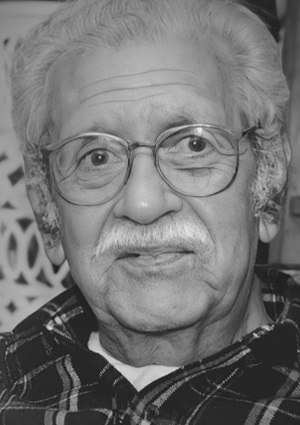Director, Screenplay, Producer
Fernando Laverde
Fernando Laverde was born on December 17, 1933, in Bogotá, where he died on May 18, 2022. A director, screenwriter, and programmer, Laverde was known for animated films such as La maquinita (The little machine, 1973); Un planeta llamado tierra (A planet called earth, 1979); Semillitas rojas (Little red seeds, 1979); and Agua que no has de beber (Don't be a dog in the manger, 1980). His work occupies a remarkable place in Colombian cinematography for being one of the few using animation techniques during the 20th century, mainly dealing with children's themes. Laverde's skills as a drawer and sculptor that he cultivated throughout his life allowed him to tell stories inviting the viewer to reflect on aspects of ecology and politics.
He graduated from the Universidad Libre high school in 1953 and studied for three years at the Faculty of Agronomy of the National University of Colombia. In 1955, thanks to his friend Pepe Sánchez and Humberto Martínez Salcedo, he joined the world of television as a coordinator of shows for Televisora Nacional de Colombia. He was later appointed producer and camera director. In 1956 he traveled to Spain and worked as an animation assistant in the group directed by Enrique Nicanor at Televisión Española in Las Aventuras de Mumu (Mumu Adventures). He also worked as director of La guitarrita española (The Spanish Little Guitar) and as cinematographer for La historia de la música (The history of music) and the documentary Ernesto Bitetti. Around this time, he also made Piccolo Saxo.
In 1969 he returned to Colombia and directed the program Niños del mundo (Kids of the world). UNESCO invited him to represent Colombia in a course for screenwriters in the Instituto Nacional de Cinematografía. He was the cinematographer for Alberto Giraldo's medium-length film Una tarde de lunes (A Monday afternoon, 1971), for which he won the Kodak Award for Best Cinematography. In 1972 he released his first animated film El país de Bellaflor (Bellaflor's country), which received the Best Film Award at the XII Cartagena de Indias Film Festival.
Colombian animation production in the 70s and 80s was marked by the exclusive production of commercials and short films. Laverde stood out for a prolific stop motion animated production thanks to the knowledge acquired in Europe, where he got inspiration from the work of Czech animators Jiří Trnka and Jiří Barta.
He directed the short films Colorín colorao (1973), La maquinita (1973), and La cosecha (The Harvest, chapter 3 of the series El país de Bellaflor) (1974). In 1975, he directed Fuegos de artificio (Fireworks), La promesa (The promise), and La chamba (The job), co-directed with Jose María Arzuaga, with whom he also created the documentaries Breve encuentro (Brief meeting), Infraestructuras (Infraestructures), and Nocturno (Nocturnal). That same year he founded the Family Film Group, with which he made Rincones de Boyacá (Boyacá's nooks and crannies). In 1978 he filmed La pobre viejecita, his first feature film, winner of the Colcultura Award for Best National Feature Film. Also in 1978, he made the documentaries Ecce homo, Frágiles formas (Fragiles shapes), Los ceramistas (The Ceramists), Rincones de Nariño (Nariño's nooks and crannies), Rincones de Popayán (Popayán's nooks and crannies), and Sobra de vida (Leftover life). In 1979 he filmed Un planeta llamado tierra, winner of the Best Animated Short Film Award at the IV Colombian Film Festival, and made Pepitas rojas, winner of the Best Short Film Award at the I International Children's Film Festival.
Thanks to the support of FOCINE, in 1983, he filmed Cristóbal Colón, his second feature film, which won the Coral Award at the V International Festival of New Ibero-American Cinema in Havana, Cuba. In 1989 he directed Martín Fierro, a co-production with Argentina and Cuba, based on a screenplay by Jorge Zuhair Jury.
Lastupdate: May 2022.
Filming
Director
MARTÍN FIERRO (1989)
Director
CRISTÓBAL COLÓN (1983)
Director
AGUA QUE NO HAS DE BEBER (1980)
Director
Director
Director
PEPITAS ROJAS (1979)
Director
LOS CERAMISTAS (1978)
Director
FRAGILES FORMAS (1978)
Director
ECCE HOMO (1978)
Director
LA POBRE VIEJECITA (1978)
Director
NOCTURNO (1976)
Director
BREVE ENCUENTRO (1976)
Director
INFRAESTRUCTURAS (1976)
Director
LA CHAMBA (1975)
Director
LA PROMESA (1975)
Director
LA MAQUINITA (1973)
Screenplay
CRISTÓBAL COLÓN (1983)
Producer
CRISTÓBAL COLÓN (1983)


